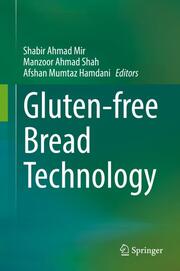-
Zusatztext
-
Market trend and the increasing diagnoses of celiac disease have encouraged extensive research into the development of gluten-free breads. Generally, the development of bread without gluten involves the use of diverse ingredients and additives aimed at imitating the viscoelastic properties of gluten and consequently obtaining quality bread products. However, developing gluten-free bread remains a technological challenge due to the key role of gluten in the breadmaking process.Gluten-Free Bread Technology provides an overview of all fundamental issues and key factors associated with gluten-free bread technology, with the emphasis on the most recent findings on the subject. The promising results of the reviewed studies indicate that the gluten-free breads developed possess similar or better sensory attributes than those of control formulations, and some are even comparable to their wheat gluten-based counterparts. Chapters of this book focus on the role of additives, dough handling, and the physical, structural, sensory and nutritional properties of the gluten-free bread. The science of gluten intolerance is explained as well. With all relevant literature gathered and summarized in one place, this text will be an essential resource for both food scientists and industry professionals pursuing gluten-free formulations.
-
-
Kurztext
-
Market trend and the increasing diagnoses of celiac disease have encouraged extensive research into the development of gluten-free breads. Generally, the development of bread without gluten involves the use of diverse ingredients and additives aimed at imitating the viscoelastic properties of gluten and consequently obtaining quality bread products. However, developing gluten-free bread remains a technological challenge due to the key role of gluten in the breadmaking process. GlutenFree Bread Technology provides an overview of all fundamental issues and key factors associated with glutenfree bread technology, with the emphasis on the most recent findings on the subject. The promising results of the reviewed studies indicate that the glutenfree breads developed possess similar or better sensory attributes than those of control formulations, and some are even comparable to their wheat glutenbased counterparts. Chapters of this book focus on the role of additives, dough handling, and the physical, structural, sensory and nutritional properties of the glutenfree bread. The science of gluten intolerance is explained as well. With all relevant literature gathered and summarized in one place, this text will be an essential resource for both food scientists and industry professionals pursuing glutenfree formulations.
-
-
Autorenportrait
- Shabir Ahmad Mir (Ph.D) obtained his PhD in Food Technology from Pondicherry University, Puducherry, India. At present, he is an Assistant Professor at the Government College for Women, Srinagar, India. He has received the Best PhD Thesis Award 2016 for outstanding research work by the Whole Grain Research Foundation. He has organized several conferences and workshops in Food Science and Technology, Dr. Mir has published numerous international papers, book chapters, and edited five books.Manzoor Ahmad Shah, is working as Assistant Professor at the Government Degree College for Women, Anantnag, Jammu and Kashmir, India. He has received MSc (Food Technology) degree with Gold Medal from Islamic University of Science & Technology, Awantipora, India, and PhD (Food Technology) from Pondicherry University, Puducherry, India. Dr. Shah has published numerous papers, book chapters and edited two books. He is an active reviewer for several international scientific journals of repute. He has attended several national and international conferences, workshops, and seminars.Afshan Mumtaz Hamdani, is working as Assistant Professor at Government College for Women, M. A. Road, Srinagar, Jammu and Kashmir, India. She has received the degree of M.Sc. and Ph. D in Food Science from University of Kashmir, Hazratbal, Srinagar, India. The author was awarded with the gold medal for outstanding performance during her M. Sc. degree program. She has 20 research publications in the internationally reputed journals. She has attended several national and international conferences, workshops, and seminars.
Detailansicht
Gluten-free Bread Technology
ISBN/EAN: 9783030738976
Umbreit-Nr.: 1120251
Sprache:
Englisch
Umfang: vi, 282 S., 5 s/w Illustr., 12 farbige Illustr., 2
Format in cm:
Einband:
gebundenes Buch
Erschienen am 09.10.2021
Auflage: 1/2021


